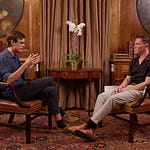David Whyte is one of the world’s top living poets. He’s been writing seriously for ~50 years, and this interview is all about his love for language and philosophy of life.
Some highlights:
Poetry is the act of overhearing yourself say things you didn't know you knew.
Good writing keeps the world alive as you name it.
Time is not slipping through our fingers; it is we who are slipping through the fingers of time.
Anger is the deepest form of care.
“You make the path by walking. By walking, you make the path.” — Antonio Machado
Just about every emotion, if a human being can feel it, is meant to be felt.
Poetry is language against which we have no defenses.
We often use language as a defense mechanism. Instead of allowing ourselves to fully experience an emotion, we'll name them in ways that create distance and keep us “safe” from having to feel them deeply.
When we talk to other people, how often are we trying to throw our voice into their bodies so they'll say what we want them to say?
Sometimes it takes darkness and the sweet confinement of your aloneness to learn what we most desperately need to learn.
In the Gospels, Peter is only able to walk on water for as long as he’s focused on Jesus calling to him, but begins to sink the moment he looks back at the boat (which represents safety and his own life).
There's no way you can follow your passion without having your heart broken.
Transcript
Table of Contents
[00:00] Introduction
David Perell:
The place I want to begin is prolonged attention.
It really hit me as I was preparing for this, that as you look and look and look at something, it almost magnifies and becomes bigger and higher resolution through prolonged attention. You can see things that you just wouldn't see in the hustle and bustle of everyday life.
David Whyte:
Yes, and it's not just the eyes, of course, there's listening. When I sat Zen for years, I had a Zen koan given to me, which was, who is listening? And that's a fierce form of attention, too.
And then, of course, there's the visual and the aural combined, so you're hearing and seeing together. But then there's the whole bodily sense of somatic feeling—just what you feel in your body. We call it in a very narrow way, feelings, but it's much larger than that. The more you pay attention, the more of that inner horizon is brought to bear on the outer horizons of life.
So it's seeing, hearing, and then this sense of bodily presence, feeling the body of the world.
And then in the meeting, there comes a place where the person who's paying attention, who was seeing and who is hearing, disappears.
I have a piece called "Revelation Must Be Terrible" because it has to do with the way you feel a kind of death occurring in your personality.
The first lines are, "Revelation must be terrible, with no time left to say goodbye. Imagine that moment staring at the still waters with only the brief tremor of your body to say you are leaving everything and everyone you know behind. Being far from home is hard, but you know, at least we are all exiled together. When you open your eyes to the world, you're on your own for the first time. No one is even interested. No one is even interested in saving you now. And the world steps in to test the calm fluidity of your body from moment to moment as if it believed you could join its vibrant dance of fire and final stillness. Fire and calm and final stillness, as if you were meant to be exactly where you are. As if, like the dark branch of a desert river, you could flow on without a speck of guilt, and everything everywhere would still be just as it should be. As if your place in the world mattered, and the world could neither hear nor speak the fullness of its own bitter and beautiful cry without the deep well of your body resonating in the echo, knowing that it takes only that first terrible word to make the circle complete. Revelation must be terrible, knowing you can never hide your voice again."
So that whole poem looks at the phenomenology of deep attention, what happens to you and what starts to break down and what falls away. Then there's this sense of if you are paying attention to the world, you suddenly realize the world is paying attention to you, and it's finding someone much bigger, much larger, more generous, more present, more fiery than the person who first began the attentive process.
I had this in a very intimate and very practical way as a naturalist guide in the Galapagos Islands, where the animals have no fear of human beings. You could be walking along the trail and you'd suddenly be looking at a hawk on a branch, which would not move and would not fly away. You can get within a few feet of it, and you're looking into the eyes of a hawk, and the hawk is looking at you. It's the absolute essence of hawkness.
When I was first there, when I think about it, I was hardly seeing or hearing anything. I might have known the Latin name of the bird, but that was actually a way of covering over the essence of what you were looking at. But after a while, things start to speak back to you in a very fierce way.
In Galapagos, what was speaking back to you was life and death, really. You experienced animals and birds dying on a daily basis, including animals and birds that you would and sea creatures that you'd got to know as individual characters. It might be a seal, a fur seal in one place that had a personality as different from the other fur seals as we have from each other. Or it might be a land iguana that also had particular traits.
You get to know these creatures and then suddenly you find them dead on the beach. Then we were traveling on this death-dealing medium called the ocean. So everything was looking back at you even more fiercely than you were looking at it.
Then I started to realize that real identity is not you, or that the identity is where what you think is you meets what you think is other than you. That's actually the place that you write from, is that meeting place, that attentive edge where things break down.
Then there's this voice that appears from that frontier. Sometimes the frontier seems way out looking at the horizon. Sometimes it's an inner horizon inside yourself below which the revelation, the truth, the beauty of what you want to say is hibernating and nested inside yourself.
[06:10] Tactile Dome and Emotional Investigation
David Perell:
Yes, you say that. I have this image when I was a kid. There was this place called the Tactile Dome in San Francisco, and it was basically like this maze that you would sort of traverse in the dark, and you would kind of try to figure out what was going on there.
David Whyte:
Yeah.
David Perell:
When you're investigating emotions, trying to make sense of the world, how much of that investigation is a sort of, you're talking about sitting meditating?
David Whyte:
The rewriting is just an outer afterthought, almost. The writing, it's the ability to have the physical experience and to be able to translate that into language which has the same movement. It doesn't lose any movement by you saying it.
[08:15] Muttering, Declaiming, and Composing
David Perell:
Like a muttering. It's not like a pen and paper. It's like your mutter.
David Whyte:
Yes, or even declaiming out loud. Luckily, in my day and age, I have the iPhone, so I can actually put it into the phone, and I don't have to memorize it as well as having said it.
David Perell:
The tactile dome.
David Whyte:
Yeah, the tactile dome of being in the dark. Often you know that what you want to write lies deep inside you, but you can't articulate it as yet. It feels like it's buried in your body somewhere. That's like a metaphor of the night, too, because it metaphorically and imaginatively feels dark inside your body. But there's all this movement there. I have a piece, actually, that I wrote. It's about the difference between writing at night and writing in the day.
David Perell:
It's a sweet darkness.
David Whyte:
It is, exactly. I noticed during one of my really intense writing periods that I had a completely different relationship to the world outside when it was dark outside the window versus when I was writing during the lighter hours of the day. I thought that's really fascinating. It's a different horizon. So this is the piece I wrote about that. It's called Sweet Darkness, which you were experiencing in the tactile dome.
David Perell:
Yeah.
David Whyte:
When your eyes are tired, the world is tired also. When your vision is gone, no part of the world can find you. It's time to go into the night where the dark has eyes to recognize its own.
David Perell:
You're meat.
David Whyte:
Exactly. You're prey of some kind, or you can just be taken out by accident by being run over by Cape Buffalo or whatever. And also, the hippopotami have come out of the water. They can't come out during the day because they get sunburned, so they graze at night.
[15:26] Attention, Distraction, and Monkey Mind
David Perell:
Earlier, you were saying as you were reading, I think it was Sweet Darkness, you said I wrote a line and I didn't even know what it meant at the time. Which is really interesting because it means that if I think of the almost like an order of operations, there's something that's coming from a subconscious intuitive source that's then being put on the page rather than the conscious mind doing that, and that there's that implies a real either a playfulness.
David Whyte:
Yes, it's what Coleridge and Keats would have called the primary imagination, where the imagination.
David Perell:
I think throughout my life I've had a fear of difficult emotions: sadness, grief, anguish, anxiety. It's still a great struggle for me to go into heartbreak, to go into that. I'm really curious to hear how you've written about, gone about writing about one of those difficult emotions.
David Whyte:
Yes.
David Perell:
I'd imagine that's unimaginably challenging, but also, if I'm hearing you correctly, can be quite fruitful.
[21:57] Galapagos, Wonder, and Deep Time
David Whyte:
Yes. Almost every quality, if a human being can feel it, is meant to be felt. It's in the constellation of the way we inhabit the world.
David Perell:
Right, in beauty and in sorrow.
David Whyte:
Don't hide it from yourself. Don't just try and feel everything. You see a homeless person in the street who's falling over because they're so exhausted or they're dehydrated, and you feel it. You don't walk past it and have a barrier against it.
David Perell:
I gaze as if admonished by another world.
David Whyte:
Yeah, because we're all walking around, actually, with a piece of paper metaphorically on our chest, saying, "This is who I am, and this is why you should give something to me." We all have two easy explanations of who we are.
[29:40] Grief, Loss, and Letting Go
David Perell:
One of the things I've been thinking about all conversation, and it really relates to your consolations books, is that, you know how many spiritual traditions talk about something along the lines of the thing without a name? Like the feng shui is this essence that we can't quite name.
David Whyte:
We.
David Perell:
We get angry about the things that are the most true to our hearts, to our purpose, whatever it is.
David Whyte:
So I'd say that my work isn't to redefine terms. My work is to create beauty. And beauty always has to do with conversational symmetries and asymmetries in the world.
David Perell:
I get anxious about being anxious.
David Whyte:
Exactly. To understand that and to experience that, that would have come from that line would have been surprising to me when I wrote it.
David Perell:
There's a lot of dualities in your work of even the inward and the outward, where what you know meets what you don't know. But the one that I want to ask you about is routine, because you're very perceptive in the way that something can either elevate us or something can sort of lower us. I guess I would say, on one hand, you could say that routine can be this empty death spiral.
David Whyte:
Yeah.
David Perell:
But also it can be disguised ritual.
David Whyte:
Yeah.
David Perell:
And that routine can be anything but routine. I think that's a beautiful way that you end that definition.
David Whyte:
Yes.
David Perell:
And I want to hear about your routine, the writer's routine.
David Whyte:
Well, I have different routines at different times according to the circumstances of my life, according to my traveling. And so during lockdown, I wrote the whole of Still Possible, more or less, in one place, my lovely study, looking out onto a garden or walking the garden.
David Perell:
Where is this? Is this in northern England?
[36:18] Play, Ritual, and Performance
David Whyte:
No, in northwest United States.
David Perell:
How have you gone about memorizing all this poetry over the years?
David Whyte:
What does that mean?
David Perell:
What does that mean? I actually don't know what it means, but it also means everything to me.
David Whyte:
When you learn it, you carry it as a beautiful question.
David Perell:
Yeah. So how have you gone about doing this?
[43:01] Gratitude, Generosity, and Community
David Whyte:
Well, literally, one line at a time. I think I was inspired to memorize because of my mother's fund of stories and poems in English and Irish. So she'd sit at the foot of my bed and have all endless poems and stories. So it just seemed normal to have this, to have this store within you.
David Perell:
Now that I've been memorizing more poetry, I just at dinner and I'll just recite a poem.
David Whyte:
Yes.
David Perell:
And I've noticed that there's this look of astonishment on people's faces.
David Whyte:
Yes.
David Perell:
And you can feel that you've crossed some sort of threshold.
David Whyte:
Yeah.
David Perell:
Between the language of everyday life and this sort of elevated language.
David Whyte:
Yes.
David Perell:
And you realize how much everyday language is just rooted in cliche. And what a poetry does, or what a poem does, is it just gives freshness to a familiar world.
David Whyte:
Exactly, yeah. I take and I'm getting used to embodying that and not apologizing for that is even more powerful.
David Perell:
You referenced earlier the beautiful question, and then we moved on to something else.
David Whyte:
Yes.
David Whyte:
I think it's the axis of invitation in every written piece.
David Perell:
Wow.
David Whyte:
You could actually go back to the person you were in that moment and thank yourself.
David Perell:
Obviously, when you prep for one of these interviews, there are always different things that you're thinking about. I always think about, what is my beautiful question? Last week, I had a conversation with a friend. We were going on a walk in Covent Garden in London.
David Whyte:
It's usually when you're the things that the point is is what makes you feel as if everything's right with the world when you're doing it. So writing's one thing for me, where everything in the world feels as if it's in the right place. Gardening is another one for me.
David Perell:
What about writing does that for you? About writing?
David Whyte:
Well, it's a fierce, attentive, one-pointedness that has a strange kind of massive amplitude at the same time. It's breaking through the narrow understanding that you have at the moment.
David Perell:
Biggest thing I've picked up about a sense of humor is we've had a few deaths on my dad's side of the family the past few years. We laugh so hard at the lunch after the funeral. We just laugh so hard as a family. I'm like, what's going on there?
David Whyte:
It's the broadening of the context.
David Perell:
Tell me about cliche.
David Whyte:
Yes, it's this too solid naming of the world. I mean, the interesting thing about cliches is that they're often cliches because they're actually stubbornly true.
David Perell:
Let's talk about the richest and most cliché topic of all, which I would say is love. I want to hear about how you have gone about writing about love. You write in all our songs, our poetry, and our dramas, both ancient and present day.
David Whyte:
I often say it's really disappointing to serious young poets when they eventually find out that it is actually just all about love. This can't be true. No. The Beatles had it all along.
David Perell:
I went on a little exercise where I would just basically keep a mental note. You sit in a cafe, you go to any public space. What percentage of songs are about love?
David Whyte:
Yes, and so that's a word that also can cover over what it's actually inviting you into. We all know in a relationship, in a long relationship, you're on the phone, "Yeah, I love you, love you, love you, love you, love you, love you." And it's just, click, you're on.
David Perell:
What do you mean?
David Whyte:
Well, it's giving people away. You know, your son or your daughter is born to you, and the promises you make, the promises of love you make to begin with, are all about absolute protection, which are really appropriate with this being in the cradle. Nothing's going to happen to you on my watch. That's the fatherly promise.
David Perell:
Tell me about finding your path as a writer. To try to make a living as a poet is just an insane proposition. I'm sure that in retrospect, you're like, "I kind of see how I did it," but it's a pretty tough thing to do.
David Whyte:
Exactly.
David Perell:
One thing I like about your work is that you give permission, even more than that, encouragement, to beckon into the unknown, driven by the compass of your heart, even if you can't define where you're going or sometimes why you're even doing it.
David Whyte:
I think a huge part of it, from a biographical point of view, I've got hundreds of stories about how I made my way as a poet. But I think the essential thing is asking for visible and invisible help.
David Perell:
Well, two things come to mind. The first is a line from Joseph Campbell.
David Whyte:
Yeah.
David Perell:
Where he says, if you can see the path laid out ahead of you, it's not your path. Your own path you make with every step you take.
David Whyte:
Oh right, yeah. I think I haven't used that in a while actually, so that was in one particular seasonality of my writing life. But it is a lovely something that shot through you in a way.
David Perell:
Well, you're talking about the word vulnerable. And I think that the kind of writing that you're pointing at is extremely vulnerable because what you're trying to do is almost surprise yourself and hear the things inside of you that you don't know are there.
David Whyte:
Yeah.
David Perell:
Even as I say that, I can feel myself getting fearful because it breaks. It transcends my sense of control.
David Whyte:
Yeah, why do you feel that fear, for instance?
David Perell:
And my heart racing or something, sweaty palms.
David Whyte:
Yes.
David Perell:
Of just.
David Whyte:
Do you have a physical?
David Perell:
Yeah, it's towards my stomach, on the right side.
David Whyte:
Yes, exactly.
David Perell:
But that's just the unexplored self. And I think that that's both the.
David Whyte:
That's where you're also you will write from.
David Perell:
Yes.
David Whyte:
It's that physical contact there that has a voice to speak to you. So to be able to keep that what seems like a pain, it's actually a frontier between not knowing and getting to know what you don't want to know.
David Perell:
That's a fun prompt or exercise. If you're thinking through a beautiful question, just put your hand on different parts of your body and try to see if your body's trying to speak to you.
David Whyte:
Stethoscope.
David Perell:
A stethoscope. It's like stethoscoping your body for words.
David Whyte:
Yep, yep. It's one way in.
David Perell:
You grew up being influenced, inspired by different poets: Dylan Thomas, Yates, Robert Sun, Gary Snyder, Ted Hughes. How do you be influenced by writers without having their voice drown out yours?
David Whyte:
Well, I don't think there's anything wrong with taking on a voice, especially when you're a young poet writing in the style of. Because very soon, you get your own, you get your own version of it.
David Perell:
We'll close with this. So last year, the highlight of my year was I got to officiate one of my best friend's weddings.
David Whyte:
And?
David Perell:
What's really hard about officiating a wedding is I'd never done it before. But we live in a culture that's so tinged with irony and cynicism, and I'm a pretty earnest person. Even me, I had a really hard time leaning into the gravity of the language that you need at a wedding. I had a really hard time with it.
David Whyte:
It came out of my own inheritance. As a child, I was really moved by all the biblical stories, even though I wouldn't have been considered a religious child. That was helped by the fact that at our Sunday school, the teachers there were really fine storytellers.
David Perell:
That is one of the core themes in scripture. Turn your eyes upon Jesus. It's the thing that you're looking at that sustains you.
David Whyte:
Beauty in the sense of the invitation to the next territory inside yourself that's equal to the astonishing beauty of the world.
David Perell:
Well, thank you. Sometimes I have conversations where I'm like, wow, I can't believe this is happening right now. And I very much felt that.
David Whyte:
Good for the past few hours.
David Perell:
Thank you so much. This was just wonderful.
David Whyte:
Thank you.










